Week ending 18 July 2020
REGIONAL OVERVIEW
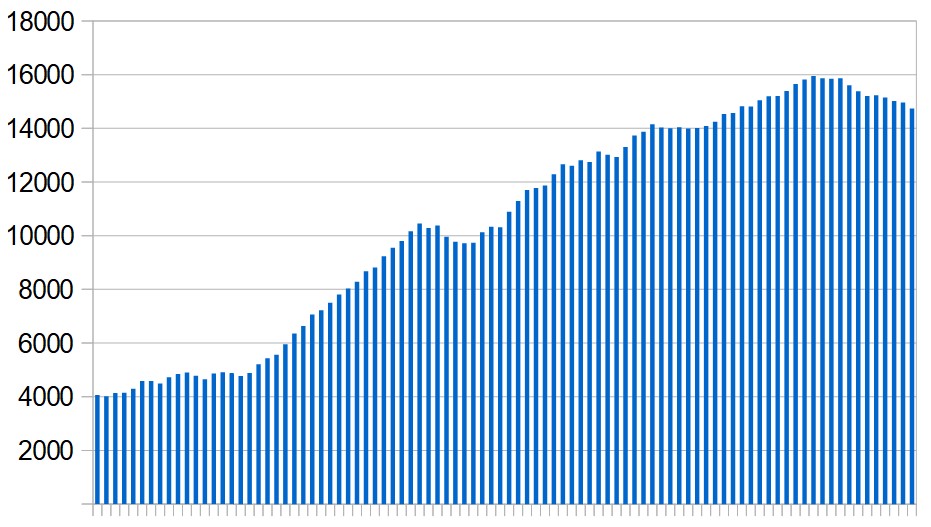 |
The past week has brought a small but possibly significant decline in the overall number of new Covid-19 infections across the Middle East and North Africa.
Over the past seven days new cases in the 20 countries monitored have averaged 14,736 a day – the lowest level for almost three weeks. Although many cases are not recorded in the official fgures, this is the first change of direction in what – apart from a small dip in May – has been a relentless upward trend.
However, there are huge differences within the region. While Jordan and Tunisia appear to have successfully contained the virus, in some of the other countries it is spreading more rapidly than ever.
The situation in Israel and Palestine is particularly alarming, and it has worsened considerably during the past week. The outbreaks in Algeria, Lebanon, Oman and Syria also appear to be gathering pace. Meanwhile, the situation seems to be improving in Kuwait, Qatar, Saudi Arabia and the UAE.
Egypt, Iran and Iraq have also reported fewer new cases during the past week but there are doubts about the reliability of their figures.
Detailed statistics for the region, based on official figures, can be found in this spreadsheet.
Previous situation reports: July 11; July 4; June 27; June 20.
ALGERIA
Algeria has seen a sharp rise in infections during the past three weeks. New cases now average more than 500 a day – twice the level at the end of June. The increase began shortly after lockdown restrictions were eased.
Although Algeria has recorded a relatively small number of cases, testing capacity is low – about 2,500 tests a day.
Healthcare workers account for about 10% of all known cases – 1,700 have been infected since the outbreak began. Some of Algeria's hospitals are reported to be full and not accepting new patients.
For more details see: Covid-19 in Algeria
Confirmed cases: 21,948
New cases in past week: 3,706
Active cases: 5,461
Deaths: 1,057
Tests carried out: (unknown)
BAHRAIN
Bahrain's situation has changed little during the past month, with new cases averaging around 500 a day. Official figures indicate that 2% of Bahrain's 1.7 million population has so far been infected.
On Wednesday the Supreme Council for Islamic Affairs announced that mosques will remain closed for at least a further two weeks. It said they will not reopen until "the required decrease" in infections is achieved. It did not elaborate on how big a decrease is required but said the decision would be left to the medical authorities.
From next Tuesday travellers to Bahrain will be charged $80 for a Covid-19 test on arrival. They must then spend 10 days in quarantine and pay another $80 for a "quarantine expiry examination".
For more details see: Covid-19 in Bahrain
Confirmed cases: 35,473
New cases in past week: 3,434
Active cases: 4,161
Deaths: 124
Tests carried out: 711,000
EGYPT
Official figures show new cases have been falling during the past two weeks but there's debate about how real the decrease is.
The Masrawi website notes that Covid-19 cases are increasingly diagnosed using chest X-rays and clinical evaluation rather than laboratory testing – in which case they are not recorded in the official figures. Increased numbers of people with mild or moderate symptoms are being advised to isolate themselves at home and stay away from hospitals. Masrawi also quotes a doctor as saying more people are seeking private treatment rather than relying on government hospitals.
There are some signs of reduced pressure on health services and occupancy of intensive care units is down from 85% to 60%, according to a health ministry adviser.
Egypt's strategy is to minimise economic damage by "coexisting" with the virus until a vaccine comes along. The night curfew which had been in force since March ended on June 27 and cafes and restaurants were allowed to reopen, though with some restrictions. The authorities have been especially keen to revive the important tourism industry and Egypt's airports reopened for international flights on July 1. However, the operators of tourist restaurants and cafes complained this week that they are losing money because of restrictions on capacity.
The Sisi regime is waging what Amnesty International describes as a "campaign of harassment and intimidation" against healthcare workers and others who question or criticise its handling of the situation. More than 70 people, including doctors, journalists and lawyers, have been arrested for expressing their views. In June, prime minister Mostafa Madbouly suggested that the spread of the virus was due to "negligence and mismanagement" by doctors.
The doctors' syndicate reported the deaths of two more members from Covid-19 of Tuesday, bringing the total to 133.
A prominent Egyptian journalist, Mohamed Monir, has also died after contracting Covid-19 while in custody. Monir was arrested last month following an appearance on al-Jazeera television, which is banned in Egypt. He was charged with "spreading fake news, joining a terrorist group and misusing social media".
For more details see: Covid-19 in Egypt
Confirmed cases: 86,474
New cases in past week: 6,239
Active cases: 54,984
Deaths: 4,188
Tests carried out: 135,000
IRAN
Iran was the first country in the region to be seriously affected by the virus and has since been hit by a second wave. Government figures show an initial wave of infections which peaked at the end of March. It subsided during April, briefly dipping below 1,000 new cases per day but then rose to a new peak in the first week of June. New infections have dropped back a bit since then, but not substantially.
Iran continues to report more coronavirus-related deaths than any other country in the region – currently around 200 a day.
Confirmed cases: 269,440
New cases in past week: 16,720
Active cases: 22,776
Deaths: 13,791
Tests carried out: 2.1 million
IRAQ
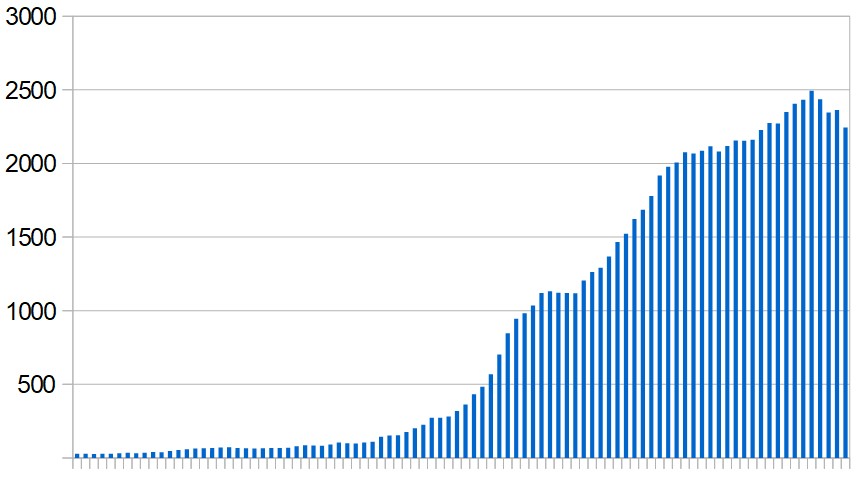 |
Iraq has seen steep rises since early June, though there has been a small drop during the last few days. Newly-recorded infections currently average about 2,300 a day, though official figures are widely believed to understate the scale of the epidemic. Many cases go unreported because of social stigma. Compliance with preventive measures appears to be low and health services are inadequate.
This week the health minister announced that a new makeshift hospital on the site of Baghdad International Fair is now ready to receive coronavirus patients.
There are reports that the blood plasma of people who have recovered from Covid-19 is being traded in Iraq at extortionate prices. The plasma is sometimes used to treat those with the disease. One man paid $1,500 for a litre of plasma on behalf of a relative who later died.
For more details see: Covid-19 in Iraq
Confirmed cases: 88,171
New cases in past week: 15,711
Active cases: 28,060
Deaths: 3,616
Tests carried out: 745,000
ISRAEL
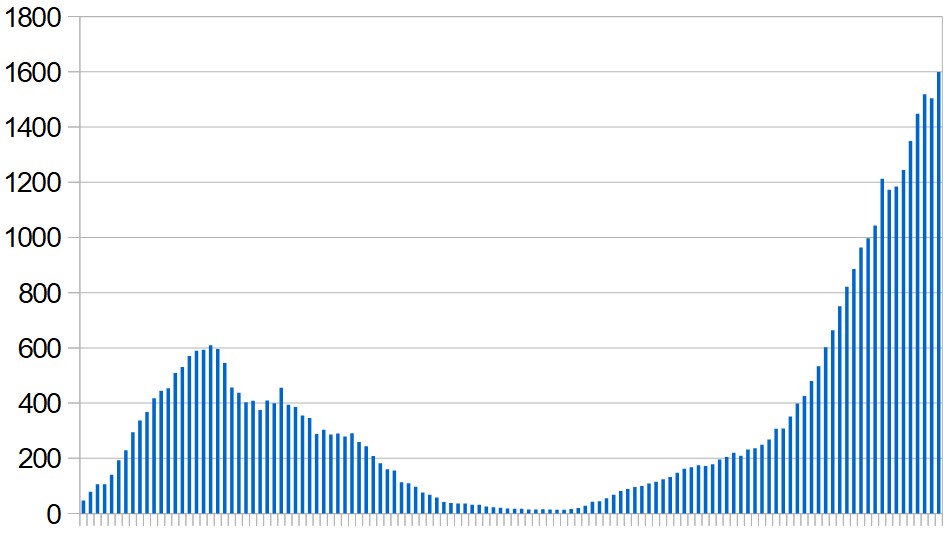 |
After coming close to bringing the epidemic under control, Israel has been hit by a second wave much larger than the first. More than 47,000 people have now tested positive for the Covid-19 virus – half of them during the past four weeks.
The first wave peaked at around 600 new cases a day in early April. Efforts to control it were intially successful and by the second half of May new cases had dropped to about 15 a day. However, the virus surged back when lockdown restrictions were lifted.
In the hope of avoiding a second nationwide lockdown the government has been trying to focus on declaring "restricted zones" in particular hotspots. There is resistance to these localised lockdowns from haredi (ultra-Orthodox) Jews who claim their rights are being violated.
A cabinet meeting on Thursday decided to impose restrictions across the country at weekends, from 5pm on Fridays to 5am on Sundays. These include closure of beaches and most shops, limiting restaurants to takeaways and deliveries, and banning gatherings of more than 10 people indoors or 20 outdoors.
This brought protests from restaurant owners who had already ordered supplies for the weekend. The government then back-tracked, allowing them to stay open this weekend. The closure of beaches has also been postponed.
There is growing disarray in the government amid disagreements about what should be done.
For more details see: Covid-19 in Israel
Confirmed cases: 47,459
New cases in past week: 11,193
Active cases: 26,323
Deaths: 392
Tests carried out: 1.4 million
JORDAN
Jordan has been one of the most successful Arab countries in controlling the virus. A few new cases are still being recorded but almost all of them are among people who were quarantined after arriving from other countries.
Queen Alia International Airport is expected to reopen for commercial flights in the first or second week of August, and on Thursday the government announced that travellers from Austria, Switzerland, Germany, Italy, Greece, Cyprus, Hong Kong and Thailand will not need to be quarantined so long as they have had a Covid-19 test 72 hours before arrival. These countries currently fall into Jordan's "green" category for coronavirus.
For more details see: Covid-19 in Jordan
Confirmed cases: 1,209
New cases in past week: 36
Active cases: 178
Deaths: 10
Tests carried out: 500,000
KUWAIT
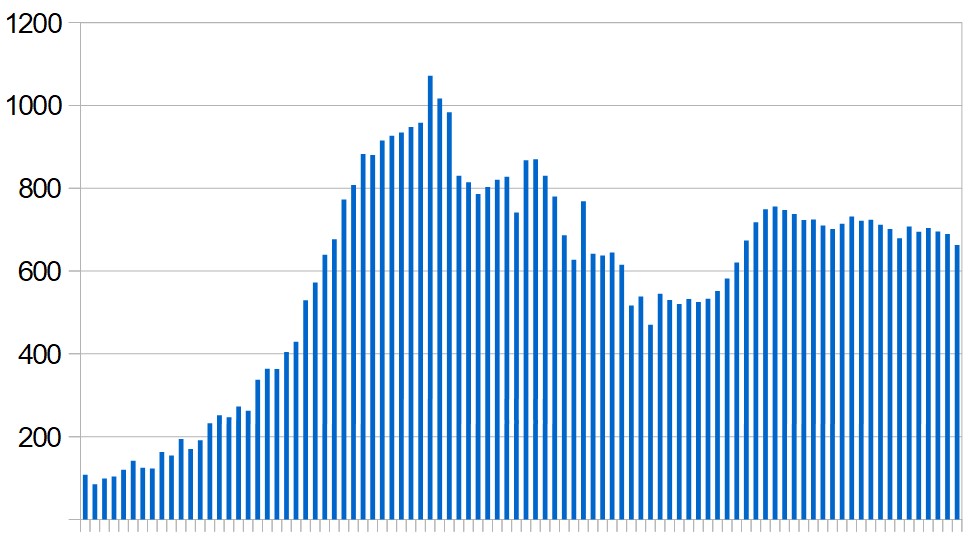 |
Kuwait appears to be over the worst. New infections peaked around May 25 and then dropped back substantially. There has since been a modest rise but the level of new cases has been relatively stable during the past two weeks – around 700 a day.
Migrant workers who often live in overcrowded conditions account for the majority of confirmed cases and many have now returned to their country of origin.
For more details see: Covid-19 in Kuwait
Confirmed cases: 58,221
New cases in past week: 4,641
Active cases: 9,436
Deaths: 404
Tests carried out: 453,000
LEBANON
In the midst of political and economic chaos Lebanon has seen a surge of infections during the past week. New cases are now running at more than 80 a day – four times the level during the first week of this month. These include more than 130 employees of Beirut's waste collection company. Seven cases were also confirmed following 70 random tests on Palestinians in the Rashidiya refugee camp.
Although Lebanon's overall figures are still relatively low, an alarming sign is that most new cases seem to be the result of community transmission. Previously, many of them were among returnees from abroad. Of the 91 cases recorded on Wednesday, 68 were among the local population and only 23 among people arriving from abroad.
In an interview this week, Firas Abiad, director general of Rafic Hariri University Hospital in Beirut suggested the authorities had eased restrictions too soon, because of economic pressures.
There is currently no curfew but the "general mobilisation" against coronavirus has been extended to August 2.
For more details see: Covid-19 in Lebanon
Confirmed cases: 2,700
New cases in past week: 618
Active cases: 1,175
Deaths: 40
Tests carried out: 201,000
LIBYA
Libya is in its ninth year of internal conflict. The UN-backed Government of National Unity in Tripoli is challenged by Field Marshall Haftar's forces based in the east of the country. There are also numerous militias.
This leaves the country ill-equipped to cope with a major epidemic. Growing levels of insecurity, political fragmentation and weak governance have led to a deterioration of basic services, particularly in the health system. At least 27 health facilities have been damaged or closed by fighting and some have been attacked directly. The number of confirmed infections is still small but testing is very limited. There are 870,000 people – refugees, asylum seekers and displaced persons – who the UN regards as especially vulnerable.
According to the WHO, most Covid-19 cases are centred around Sebha, an oasis city 400 miles south of Tripoli. Sebha is close to the borders with Niger, Chad and Algeria, and is a major hub on the migration route from Africa to Europe. It currently hosts about 40,000 migrants. A Swiss-based organisation, REACH, has issued a detailed report on the situation there.
For more details see: Covid-19 in Libya
Confirmed cases: 1,704
New cases in past week: 362
Active cases: 1,277
Deaths: 47
Tests carried out: 38,000
MOROCCO
Morocco seemed to be making good progress until recently. A strict lockdown had kept the total of known Covid-19 cases below 10,000 and by early June new infections had fallen to around 40 a day. However, workplace infections have since caused some serious problems. There was a major setback towards the end of June with the discovery of hundreds of new cases in the Kenitra area, most notably among women from rural villages employed to pack strawberries (see report). A major outbreak was later discovered at a fish-canning factory in the coastal town of Safi.
The situation now seems to be improving again. New cases during the past week averaged 200 a day – a drop of one-third compared with the previous week.
For more details see: Covid-19 in Morocco
Confirmed cases: 16,726
New cases in past week: 1,398
Active cases: 2,102
Deaths: 264
Tests carried out: 973,000
OMAN
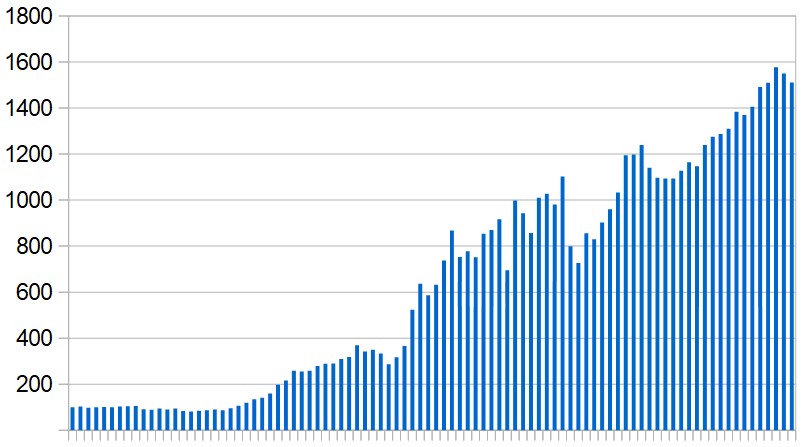 |
Oman has so far recorded 64,000 cases – most of them during the past month. Previously, most new infections were occurring among foreigners – predominantly migrant workers from poor countries. That has now changed and the majority are Omani citizens. Among the 1,169 new cases announced on Friday, only 32% were non-Omanis. The health ministry blames "continued indifference" by the public, saying that "most of the infections among citizens could have been easily avoided".
On Wednesday, nine people were each fined 1,000 riyals ($2,600) for their involvement in a gathering that was prohibited under the coronavirus restrictions.
There also appears to be a problem with employers failing to report suspected cases among their workforce – presumably to avoid disruption of their business – and the authorities are threatening to carry out spot checks, with additional penalties for violations, including fines of $295 for not wearing face masks in workplaces.
Oman, with a five-million population, currently has more than 22,000 active cases and health services are coming under pressure. They are said to be coping at present but in the expectation of further increases plans have been announced for a new field hospital with 250-300 beds.
For more details see: Covid-19 in Oman
Confirmed cases: 64,193
New cases in past week: 10,579
Active cases: 22,424
Deaths: 298
Tests carried out: 267,000
PALESTINE
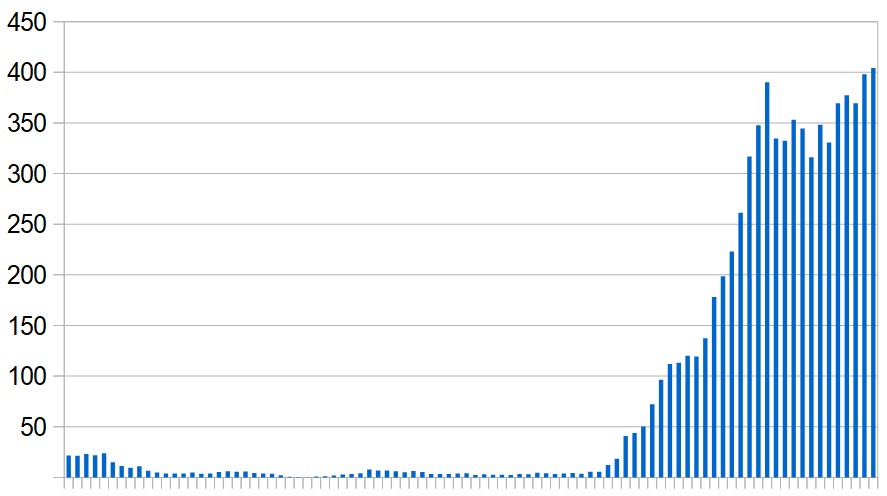 |
Palestine, like Israel, is in the midst of a wave of new infections. More than 9,000 cases have been recorded since the outbreak began – 30% of them during the past week. Hebron is the most seriously affected area, accounting for more than 60% of all confirmed cases
Many of the recent infections are attributed to people ignoring the rules for social distancing, which the authorities have difficulty enforcing. The health ministry says more than 30% of cases are the result of Palestinians travelling to and from work in Israel where new cases are also increasing.
Fears of a major epidemic in Gaza have not materialised. Most of the known cases there were apparently due to contacts with Egypt.
For more details see: Covid-19 in Palestine
Confirmed cases: 9,055 (West Bank 7,692, Gaza 72, East Jerusalem 1,291)
New cases in past week: 2,830
Active cases: 7,335
Deaths: 56
Tests carried out: 155,000
QATAR
In population terms Qatar has more known cases than any other country – 36,500 per million inhabitants. Migrant workers have been disproportionately affected. Qatar's epidemic reached a peak in the first week of June and new cases have fallen steadily since then. During the past week new cases averaged 467 a day, compared with more than 1,800 a day at the peak.
For more details see: Covid-19 in Qatar
Confirmed cases: 105,898
New cases in past week: 3,268
Active cases: 3,148
Deaths: 153
Tests carried out: 436,000
SAUDI ARABIA
Saudi Arabia has the largest number of recorded cases among the Arab countries. New infections reached an initial peak in the fourth week of May, then dropped back slightly before rising to a higher peak in the third week of June. More recently, there has been a substantial improvement. During the past week new cases averaged 2,766 a day – about 1,600 below the June peak.
Migrant workers have been disproportionately affected but the authorities have also complained about non-compliance with precautionary measures by Saudi citizens.
The authorities have announced a series of precautions for the Hajj (the annual pilgrimage to Mecca) which is due to start on July 28 and normally attracts millions of Muslims from around the world. It will be restricted to about 1,000 participants who will be quarantined both before and after the event.
Although participation will be limited to people already living in the kingdom the Saudi authorities still want it to be seen as an international event and say 70% of places will be allocated to non-Saudi residents. They have also announced that anyone found "trespassing" on the holy sites during the Hajj will be fined 10,000 riyals ($2,666).
Touching the Kaaba will be forbidden, and pilgrims must wear masks and stay at least 1.5 metres apart. It's also reported that holy water from the Zamzam well will be pre-bottled and sterilised pebbles will be provided for the ritual stoning of the devil.
A number of healthcare workers have been invited to take part in the Hajj in recognition for their efforts during the epidemic.
For more details see: Covid-19 in Saudi Arabia
Confirmed cases: 245,851
New cases in past week: 19,365
Active cases: 52,283
Deaths: 2,407
Tests carried out: 2.5 million
SUDAN
The coronavirus struck Sudan in the midst of a political transition following a popular uprising against the regime of President Bashir and the country is ill-equipped to cope with a major epidemic. Testing is very limited and official figures don't reflect the full scale of the outbreak. Most cases are said to be in and around the capital, Khartoum, but there's also concern about the Darfur area where large numbers of deaths have been reported, apparently caused by Covid-19.
The OCHA has previously reported on the deterioration in Sudan’s health care system which was already "under extreme stress" before the arrival of Covid-19. It said 81% of the population have no access to a functional health centre within two hours' walk from their home. Some existing facilities have been closed due to virus outbreaks or lack of medical staff.
For more details see: Covid-19 in Sudan
Confirmed cases: 10,527
New cases in past week: 287
Active cases: 4,258
Deaths: 668
Tests carried out: (unknown)
SYRIA
According to the official figures, Syria's outbreak is still small but growing steadily. Only 496 cases have so far been recorded, but almost half of them have occurred this month. Official announcements rarely give any details.
One problem appears to be that people with Covid-19 symptoms are reluctant to contact the authorities, and the regime has now set up a toll-free number (195) where the public are encouraged to report those they suspect of being infected.
Fears have been raised about north-western and north-eastern parts of the country which are outside the regime's control. Millions of displaced people are living in those areas and health services are often rudimentary. According to Syria in Context (a subscription newsletter) eight cases have now been identified in the north-west. The first of these was a doctor working at a hospital in Idlib province who had a large number of contacts before testing positive.
Six cases were previously confirmed in north-east Syria. One died and the others have since recovered.
For more details see: Covid-19 in Syria
Confirmed cases: 496
New cases in past week: 102
Active cases: 327
Deaths: 25
Tests carried out: (unknown)
TUNISIA
There is currently little transmission of the virus inside Tunisia. New cases during the past week averaged 14 a day.
For more details see: Covid-19 in Tunisia
Confirmed cases: 1,336
New cases in past week: 96
Active cases: 191
Deaths: 50
Tests carried out: 82,000
UNITED ARAB EMIRATES
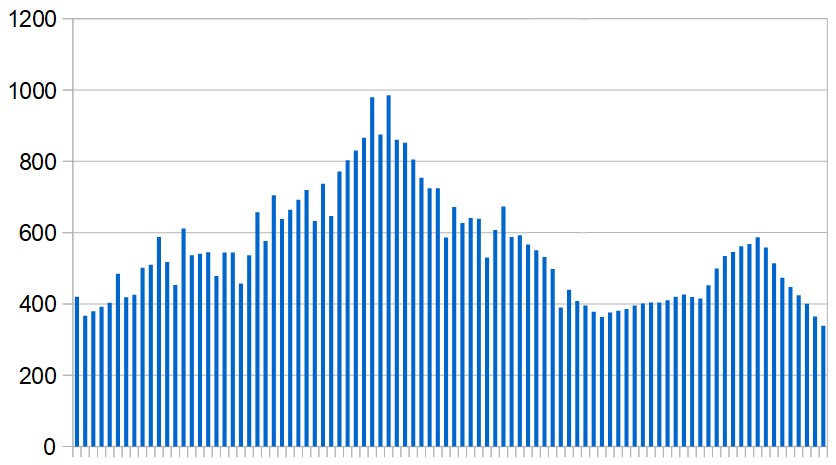 |
The UAE's epidemic peaked in the last week of May when new cases were running at more than 900 a day. New cases dropped below 400 a day towards the end of June. There was a small blip earlier this month but new cases are now on a downward trend again. The average during the past week has been 339 a day.
For more details see: Covid-19 in the UAE
Confirmed cases: 56,422
New cases in past week: 2,372
Active cases: 7,637
Deaths: 337
Tests carried out: 4.4 million
YEMEN
Official figures from Yemen are not credible. The evidence from unofficial sources is that many Covid-19 infections and related deaths are not being recorded.
Because of the ongoing war, Yemen already faced a humanitarian crisis before the coronavirus arrived. Millions are malnourished and vulnerable to disease, and health services are inadequate. Official figures do not reflect the severity of the epidemic. Unusually large numbers of deaths are reported, many of them from symptoms resembling Covid-19 and hospitals often refuse treatment if coronavirus is suspected. The Houthis, who control the capital, Sanaa, and much of the north, have a policy of not reporting cases so as to avoid lowering morale and distracting from their war effort.
During May and the first half of June large numbers of deaths were reported in the southern city of Aden, which appeared to be the epicentre of Yemen's outbreak. Many also fell ill with symptoms typical of Covid-19, though testing was very limited.
According to a doctor living in Aden, the virus has now almost disappeared from the city, and official figures (for what they are worth) seem to support that claim. Since the beginning of this month the authorities in southern Yemen have recorded 359 new cases, of which only four were in Aden. The vast majority – 241 cases – were in Hadhramaut province to the east of Aden.
For more details see: Covid-19 in Yemen
Confirmed cases: 1,580
New cases in past week: 196
Active cases: 441
Deaths: 441
Tests carried out: (unknown)

 RSS Feed
RSS Feed
